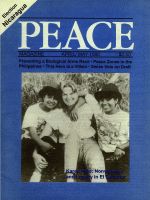
Peace Magazine Apr-May 1990, page 29. Some rights reserved.
Search for other articles by Jean Smith here
Peter McFarlane, Northern Shadows: Canadians and Central America
PETER MCFARLANE'S Northern Shadows: Canadians and Central America, shows that Brian Mulroney's approval of the U.S. invasion of Panama was not an aberration. The Canadian government and many Canadian companies have worked with a series of military strongmen. Most of those dictators were supported, if not actually installed, by the United States. Canadians operated within that set-up.
Northern Shadows starts out in 1904 with an account of the Guatemalan venture of Van Horne (of CPR fame) in partnership with the United Fruit Company. Their arrangement with the dictator of the day allowed them to construct a railway across Guatemala under terms giving them "a monopoly on cross-country transportation" and "hundreds of square miles of Guatemalan land." It covers the mining adventures of Falconbridge and Noranda in El Salvador and Nicaragua where Noranda discovered the "superprofits that could be made in the relatively uncontrolled exploitation of Third World resources." The book ends after the 1988 election when the Muironey government confronted peace initiatives of increasingly independent-minded Central American governments.
In the mid '50s when the Cold War was at its height, politicians, church and labour people in Canada were trying to outdo each other in their anti-com-munism. When the democratically elected government of Guatemala wanted to buy back some of the unused land of the United Fruit Company so that its people could eat, the Americans cried "communist." McFarlane uses the words of Archbishop Dom Helder Camera of Brazil: "I brought food to the hungry, and they called me a saint. I asked why the poor were hungry, and they called me a communist."
THE STORY OF INCO's mining adventure in the Zacapa-Lake Izabal area of Guatemala illustrates all that was unscrupulous and greedy in Canada's relations with Central American countries. The Canadian government gave INCO tens of millions of dollars in interest-free loans. At the same time the company was laying off workers in Canada at Sudbury, Ontario and Thompson, Manitoba. INCO made the military government a minority shareholder (30%) which was to guarantee "stability" in the Zacapa-Lake Izabal region in return. McFarlane's account of the result describes the brutality in which a "number of INCO's Guatemalan critics and labour activists at the mine were mysteriously murdered. Thousands of men, women and children living in the area were slaughtered by the Guatemalan military." Colonel Arana Osono, known as the Butcher of Zacapa, later became President of Guatemala and had his picture taken with INCO Vice-President Joseph Borgatti, when a final agreement for the development was signed. When INCO cut and ran in 1980 they angered the military but relieved the Canadian government, which was finally worrying about Canada's close cooperation with one of the worst human-rights abusers in the hemisphere.
Working in the shadow of the American economic and political domination of Central America, Canadian business and government have ignored the warnings of such groups as LAWG (Latin American Working Group), churches, the Canadian Labour Congress, and many otliers, including some members of the government. During the sixties many groups had begun to see the real cause of unrest in Central America. The coup in Chile prompted massive involve-ment by social action groups to publicize what was happening and to organize material relief for the victims of repression in Central America.
Many groups are now trying to help the people of that area and McFarlane gives a sympathetic account of their work. By embarrassing our govern-ment, they have forced it to recognize the injustice in Central America.
Jean Smith manages PEACE's office.

Peace Magazine Apr-May 1990, page 29. Some rights reserved.
Search for other articles by Jean Smith here